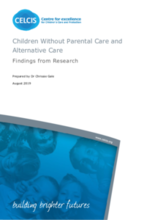The purpose of this short paper is to contribute evidence regarding the situation of children without parental care and suitability of alternative care.
Alternative care settings as described in the UN Guidelines for the Alternative Care of Children (UN Guidelines)1 may be formal or informal in nature. The research studied for this paper primarily concerned formal care. This paper has also been written with reference to three particular models of alternative care: ‘family-based care’ as for example, foster care, ‘small residential care settings’ often known as small group homes, and ‘institutions’ identified in the UN Guidelines as ‘large residential care facilities’.
In ‘Moving Forward’, the handbook written to accompany the UN Guidelines, Cantwell et al. (2012) refer to the ‘necessity’ and ‘suitability’ principles. The development of this paper has been guided by these principles. These principles recognise the primacy of preventing family separation and the premise that no child should be deprived of parental care unless this is carefully assessed as a necessary safeguarding measure. When such actions are taken they must always be in a child’s best interests and any consequent decisions should ensure a child’s ‘full and harmonious development’ (UN General Assembly 2009). In addition, the form of alternative care chosen for each child should be the most suitable to meet their individual needs, circumstances and wishes. This cannot include placement in institutions – – a form of care which should be gradually eliminated (UN General assembly 2009).
Although not always conclusive, the preponderance of evidence in this paper provides an indication as to the necessity of providing a continuum of suitable care settings.

